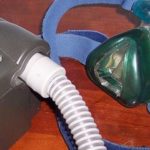1. In this randomized controlled trial, sulthiame was shown to be a safe oral medication that can improve sleep apnea symptoms.
2. However, the medication sulthiame was associated with more adverse events, such as paresthesia and headaches, compared to placebo.
Evidence Rating Level: 2 (Good)
Obstructive sleep apnea (OSA) is a condition that’s associated with a range of cardiometabolic diseases, including hypertension, arrhythmia, stroke, and diabetes. The main treatment for OSA is continuous positive airway pressure therapy (CPAP), but this is not always effective due to patient adherence. The drug sulthiame, (STM) has been shown to inhibit the enzyme carbonic anhydrase, which has been implicated in one of the main pathological mechanisms of OSA. However, the safety and efficacy of this drug has not been tested in patients with OSA.
This randomized, placebo-controlled, double-blind dose-guiding study was designed to evaluate safety and tolerability of STM in patients with moderate and severe OSA who cannot comply with CPAP therapy. The study involved five consecutive dose escalation cohorts over 4 weeks of treatment, with 68 patients randomized to receive either STM or placebo. Patients were included if they were between 18 and 75 years, had a body mass index between 20 and 35, an Epworth Sleepiness Scale score of at least 6, and had an apnea-hypopnea index greater than 15, corresponding to moderate to severe OSA. Sleep was assessed using polysomnography and patient-reported outcomes were also collected.
Results demonstrated that STM was safe and well tolerated amongst patients with moderate and severe OSA, with no severe adverse events (AEs) attributed to the medication, in keeping with the known safety profile of STM. Specifically, a 200 mg dose had a more favorable tolerability profile compared to 400 mg. The number of AEs were higher in the STM treatment group than placebo; however, commonly reported AE’s including paresthesia’s and headaches were generally short lasting and mild. Compared to the placebo, the apnea-hypoxia was significantly reduced in the STM group. Sleep efficacy and latency were also improved with STM administration. However, this study was limited by its short study period of 4 weeks and the exploration of only 2 doses. Nonetheless, this study provides evidence that the safety profile is acceptable and can improve OSA symptoms.
Click to read the study in American Journal of Respiratory and Critical Care Medicine
Image: PD
©2022 2 Minute Medicine, Inc. All rights reserved. No works may be reproduced without expressed written consent from 2 Minute Medicine, Inc. Inquire about licensing here. No article should be construed as medical advice and is not intended as such by the authors or by 2 Minute Medicine, Inc.


